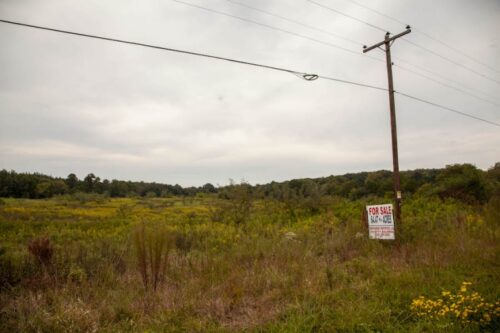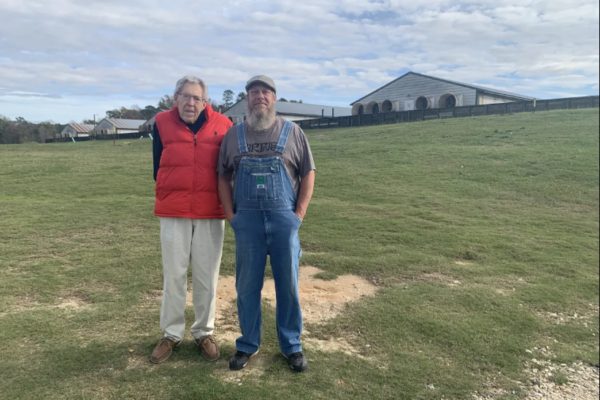By: Lisa Sorg, NC Policy Watch
September 28, 2020
Although not the farmer, Sen. Tom McInnis of Richmond County owns the land
A proposed poultry farm near Goldston in Chatham County could raise nearly 750,000 birds each year near an important waterway, yet many of the details are secret even though taxpayer funds are bankrolling much of the construction and it’s being built on a state senator’s property, a Policy Watch investigation has found.
The USDA’s Farm Service Agency is in charge of the loan. The amount is not specified in public documents, but federal policy caps guaranteed operating loans at $1.75 million. The USDA offers FSA guaranteed loans to lenders that work with farmers who can’t borrow from conventional banks.
Because of restrictive state and federal disclosure policies, the farmer’s name was redacted. However, some of the redactions were poorly done, revealing the farmer’s name as Kyle Jackson Fields. He already raises more than 100,000 birds in three barns on nearby Bear Creek Road for Mountaire Farms, according to Chatham County property records. Fields is seeking a loan to build four barns, each 66 feet by 400 feet, and capable of holding 40,000 broilers each, which he would also raise for Mountaire. The company has a large slaughter facility 10 miles away in Siler City.
Fields did not return a phone message seeking comment.
State Sen. Tom McInnis’s company Watson Place LLC, is listed as the landowner for the proposed new farm, according to a tax parcel number listed in a USDA public notice, and confirmed in Chatham County property records. The 64-acre tract, a mix of forest and scrub, is in the 8800 block of Old US 421 South.
A three-term Republican, Sen. McInnis lives in Richmond County. As a member of the Senate Agriculture and Natural Resources Committee, he has routinely advocated for shielding industrialized farms from scrutiny. McInnis did not return phone calls at his home or two of his real estate businesses.
The dearth of details about this taxpayer-subsidized industrialized poultry farm adds yet another layer of secrecy to an opaque system that protects the state’s agribusiness. Few regulations govern giant poultry farms, which largely operate with impunity. The NC Farm Act, co-sponsored by McInnis, made certain state records off-limits. And a new federal law, currently being legally challenged by several environmental rights groups, would exempt projects receiving Farm Service Agency loans such as this one, from an environmental review entirely.
Since Fields submitted his loan request to the FSA before the change, the USDA did require an environmental assessment for the farm because it is using federal funds. And a review of the assessment shows the importance of making this information publicly available — even if it’s inaccurate.
The environmental assessment, drafted by the FSA, is so rife with errors that it is difficult to meaningfully comment on it. For example, the assessment lists two different addresses that put the farm on opposite sides of the road. Only by matching the tax parcel number listed in a public notice was it possible to verify the address.
The assessment also claims there is no nearby surface water even though property abuts Bear Creek, a tributary of the Rocky River in the Upper Cape Fear River Basin.
The document lists a conflicting number of chickens that could be raised. On several pages, the document says the maximum number per flock is 211,200; other pages list the figure as 162,400. The number of flocks per year is estimated at 4.7.
USDA Farm Loan Manager Suzanne Simpson, who helped prepare the Environmental Assessment, told Policy Watch via email that the inconsistencies noted by Policy Watch would be added to the public comment file. Simpson works out of the USDA office in Monroe, in Union County.

Jonas Asbill, a specialized poultry agent for the North Carolina Cooperative Extension, prepared a “litter management plan” for the project independent of the Farm Services Agency. Asbill told Policy Watch that the 162,400 figure is accurate. “I cannot speak to the 211,200 number,” he said. The estimated amount of manure, including bedding material, is 1,169 tons per year.
Fields would use a dry litter management system, according to the assessment, and the farm would not need a state permit. Only the very few poultry farms using “wet litter,” are required to have a state water permit; the majority of operations, which ostensibly keep their litter “dry,” are not, even though that waste is ultimately spread on farm fields, where it can run off during heavy rain.
The litter management plan for the farm calls for the manure to be spread on “neighboring farms in the community in accordance with best management practices to avoid possible impact to water and endangered species.” The assessment says that woods on two sides of the property will filter runoff and sedimentation from the farm.
Connie Allred, who lives in Chatham County and participates in a StreamWatch program noted that according to maps, the property is on an unnamed tributary to Bear Creek and lies within 100 feet of the floodplain. In her comments to the USDA, which she shared with Policy Watch, Allred noted the presence of two other concentrated animal feeding operations (CAFOs) within two-and-a-half miles also border Bear Creek; a DEQ database lists 18 sludge land application sites in the Bear Creek watershed upstream of the proposed CAFO site.
“The cumulative impact from the proposed CAFO combined with the already existing multiple sources of pollution in the area represents a serious threat to surface and ground water as well as air quality in the area surrounding this proposed site,” Allred said.
Bear Creek is part of the larger Cape Fear River Basin; just two miles downstream from the proposed farm a segment of the creek is listed as “fair” on the federal impaired waters list, because pollution is interfering with aquatic life.
Ryke Longest, co-director of the Duke University Environmental Law and Policy Clinic, also reviewed the 180-page assessment. Only two of those pages covered “the adverse environmental impacts which dozens of scholars have documented from studying CAFOs,” he said. “And those pages dismissed any concerns about impact on surface water, groundwater or air quality without any explanation of the analysis process undertaken, if any.”
The assessment excludes any mention of a water pollutant phosphorus that the facility will produce. This omission ignores the USDA’s general findings, listed on its website, that “the annual litter from a typical broiler house of 22,000 birds contains as much phosphorus as is in the sewage from a community of 6,000 people.”
That figure is equivalent to 22 Goldstons, population 268.
According to the assessment, four endangered species “may occur” within the proposed project area, but not “at the site of the proposed action”: harperella, a rare plant, the red-cockaded woodpecker; the Cape Fear shiner, a fish; and a freshwater mussel the Atlantic Pigtoe. Thus, there would be no impact to endangered and threatened species, the USDA concluded.
Simpson did not answer a question from Policy Watch as to whether anyone from the agency visited the property or if the review was based solely on document research.
An environmental assessment or a more involved impact analysis, required under the National Environmental Policy Act — NEPA — was one point of leverage the public and other watchdogs had to scrutinize these large farms. These environmental reviews documented for the record the potential harms to neighbors and downstream communities. They also required advance notice and a public comment period for new or expanded CAFOs, much like occurred with the Chatham County project.

“If there was an insufficient environmental assessment, someone could challenge it, and they have to do redo it,” said Kym Hunter, senior attorney with the Southern Environmental Law Center.
But under the Trump administration’s series of regulatory rollbacks, these tax-subsidized farms may no longer be subject to NEPA and its environmental review, at least not before the loan is approved.
Last week several groups, including the Waterkeeper Alliance and the Animal Legal Defense Fund, sued the federal Council on Environmental Quality, which is in charge of the law’s rewrite. The change in the law, wrote the plaintiffs’ lawyers, “now assumes these facilities have no environmental impact and exempts them entirely from NEPA.”
Unlike the swine industry, which is regulated by the state, albeit lightly, the poultry industry in North Carolina gets a pass. Because of North Carolina law shielding the industry, the state Department of Environmental Quality exerts so little oversight of poultry operations that it doesn’t know the actual number of farms or individual poultry. The state Agriculture Department does keep a count, but considers that information confidential. Based in part on aerial flyovers, environmental watchdogs have estimated the number chickens and turkeys in North Carolina at at least 538 million.
In recent years, even the most innocuous of legislative proposals examining the poultry industry has failed to make it out of committee. That’s due in large part to Rep. Jimmy Dixon, Sen. Brent Jackson and McInnis, who consistently resist such measures.
McInnis was among the co-sponsors of the most recent NC Farm Act, which removed certain Soil and Water Conservation District records regarding industrialized animal operations — including poultry — from Public Records laws. This action mirrored the 2008 US farm bill, which continues to allow federal agencies to keep secret information concerning an agricultural operation, farming or conservation practice, even if the people involved are receiving taxpayer-backed USDA loans and subsidies. As of Dec. 31, 2019, the USDA has provided $115.7 million in direct and guaranteed loans to 2,186 borrowers in North Carolina, according to public data.
And in June 2019, McInnis opposed a measure introduced by State Sen. Harper Peterson that would have allowed the state to merely study the health and environmental impacts of dry litter poultry waste, count the poultry farms and their locations in flood plains, as well as estimating how much litter they produce.
In voicing his opposition, McInnis simply said: “I like fried chicken on Sunday.”





